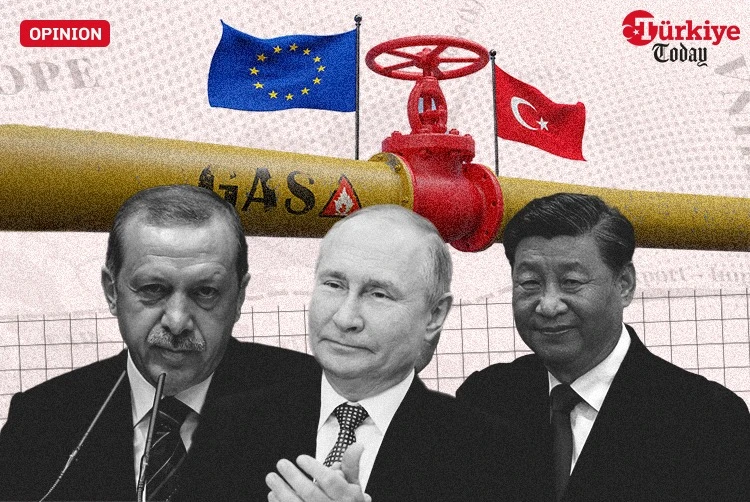Energy hub Türkiye on EU-China-Russia axis

The recent meeting between Chinese President Xi Jinping and his Russian counterpart, Vladimir Putin, underscored the evolving geopolitical landscape, presenting a unique opportunity for Türkiye.
While the depth of the China-Russia partnership remains under negotiation, Türkiye is poised to become a crucial player in a potential Eurasian economic realignment.
Imagine a future where Türkiye transcends its geographical position and transforms into a bustling Eurasian energy hub. Russia’s gas flows westward, not through traditional pipelines, but through a network centered in Istanbul.
Here, a revolutionary shift occurs transactions are denominated in renminbi, not the ubiquitous U.S. dollar. This renminbi-powered trade extends beyond Russia, becoming the cornerstone of Türkiye’s commercial relationship with China.
This scenario, while hypothetical, presents a compelling vision for Türkiye’s economic future.
Several key developments would unlock this potential:
- Renminbi-denominated Gas Trade: By ditching the dollar for renminbi in gas trade with Russia, Türkiye weakens the dollar’s dominance and strengthens the renminbi’s foothold in the region. This aligns with China’s ambitions to internationalize its currency and offers Türkiye a potentially more stable and strategically beneficial partner.
- Istanbul Financial Center as a Renminbi Settlement Hub: Establishing a renminbi settlement center within the Istanbul Financial Center would be a game-changer. Businesses across Eurasia could clear and settle renminbi-denominated transactions efficiently, bypassing the traditional dollar-centric system. This would attract significant foreign investment and solidify Istanbul’s position as a financial powerhouse.
- Diversification of Trade Finance: With the renminbi flowing freely, access to lower interest rate foreign currency credit becomes a possibility. Turkish companies could tap into a new pool of capital, potentially reducing reliance on expensive dollar-denominated loans and boosting economic activity.
- Breaking the Dollar Hegemony: The current global financial system heavily relies on the U.S. dollar. This scenario presents an opportunity for Türkiye to chip away at this dominance. By promoting the renminbi as an alternative reserve currency, Türkiye fosters a more multipolar financial landscape, potentially leading to greater economic stability and independence.
Challenges and considerations:
- Geopolitical Landscape: The success of this strategy hinges heavily on the complex geopolitical landscape. Maintaining a delicate balance between Russia, the U.S. and China will be crucial.
- Market Confidence: Building trust and confidence in the renminbi as a viable alternative currency will require sustained efforts and a stable economic environment in Türkiye.
The road ahead
Embracing the renminbi as a key currency for regional trade and establishing Istanbul as a renminbi settlement hub positions Türkiye as a pivotal player in the evolving global financial landscape.
While challenges exist, the potential rewards – a more diversified and resilient economy, a reduction in dollar dependence, and a stronger regional presence – are significant.
By strategically leveraging its geographical advantage and fostering renminbi-based trade, Türkiye can usher in a new era of Eurasian economic cooperation.
Türkiye’s strategic role
In the evolving China-Russia relationship, Türkiye’s position as a neutral party with strong ties to both becomes even more critical.
Türkiye can act as a bridge between these two giants, facilitating trade and fostering economic cooperation across Eurasia. By establishing a renminbi settlement center in Istanbul, Türkiye positions itself as a central hub for this new economic order, attracting investment and solidifying its role as a major player in the region.
Caner Ozdurak holds a Ph.D. in Financial Economics from Yeditepe University, preceded by an MA in Business Law and an MSc in International Finance from Istanbul Bilgi University. The author has also worked at prominent organizations such as the Finance Office of the Presidency of the Republic of Türkiye. He is currently a full-time Associate Professor of Macroeconomics at Beykoz University.



